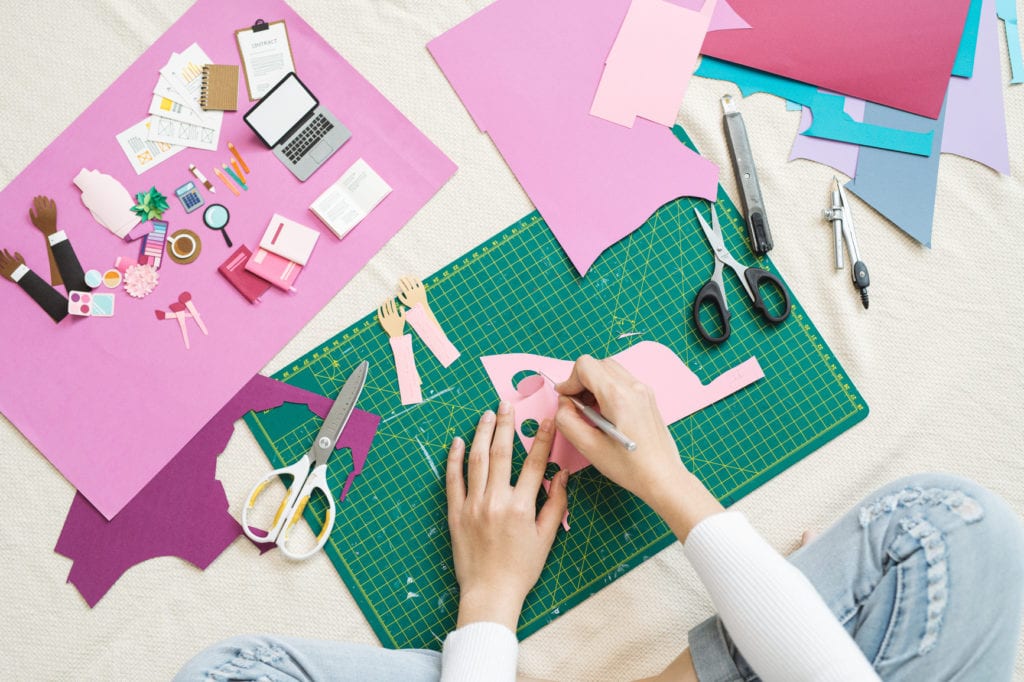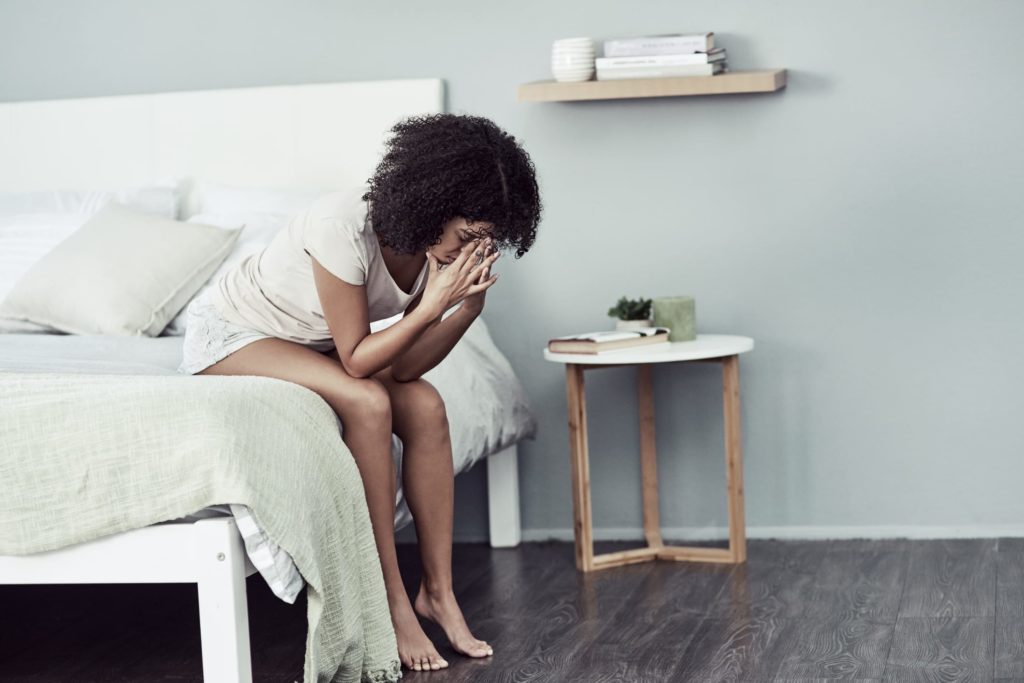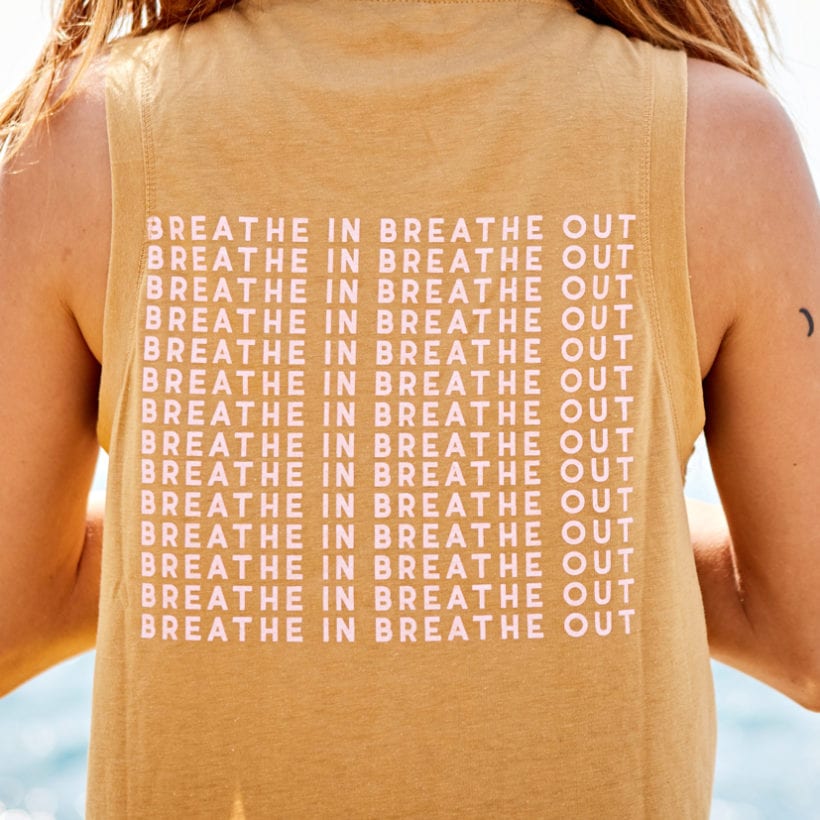You’re in the middle of a seemingly ordinary afternoon when all of a sudden, you begin feeling anxious. Maybe your hands start to sweat. Your heart may race. And you feel this increasing level of worry and fear. Sometimes, anxiety comes out of nowhere, throwing us an emotional curveball. In addition to curbing our productivity and threatening our self-confidence, anxiety can also make us feel unsteady and uncertain. That’s why it’s essential to understand the surprising cause of this common mental illness, and more importantly, how to combat these symptoms when they bubble up. Here, we spoke with therapists for coping mechanisms:
You haven’t moved all day.
There’s no way around it: exercise is essential for our overall health and wellbeing. However, you may go through life periods where you are less active. Particularly over the last year, as many people have lived and worked from their homes, squeezing in a sweat session or a strength-training routine hasn’t been as accessible or a priority. It’s easier to plop down on the couch, scroll through Instagram or TikTok, and remain idle. But if you’ve been experiencing heightened anxiety lately, it could be because you aren’t giving your body what it needs through fitness, explains Jenny Black, author and a licensed marriage and family therapist.
“If you notice your anxiety increasing as your time on screens is increasing, your anxiety might be telling you that you need to move,” she continues. “When we don’t move, we have no way to get stress hormones out of our system. When our minds have had more stress than our bodies, we will feel anxious. We must move every day to manage anxiety.”

A good rule of thumb, according to Black, is to match the intensity of your physical movement with the intensity of the current stress in your life. If you need to clear your head, go for a long walk. If you need your heart to stop pounding, get out the energy by running or a cardio workout. If you have spent too much time looking at your computer screen, take a break and do jumping jacks or stretches, she recommends.
You made a mistake — and were called out for it.
You’re halfway through an important presentation for work, and you stumbled over some words. Rather than moving forward, an annoying colleague calls you out on your mistake. While these kinds of blunders happen to everyone, when we are put in the spotlight, it can create intense anxiety, according to marriage and family therapist Shari Foos, MA, MFT, MS, NM. “Having someone correct you is hard to take, and it’s easy to either shut down or double-down and get defensive,” she adds.
However, while it’s hard to fight the bubbling up emotions, Foos says it’s vital to take a deep breath and attack the symptoms right-then and there. Foos says if someone corrects you on something and they are right, say ‘thanks’ and move on. Or, if you want to make a joke, go for it. “Mistakes are great conversations waiting to happen if you open yourself up to them,” she continues. “Anyone can relate to the experience of getting something wrong, don’t run from the feeling, talk it through.”
You’re constantly watching the news.
There’s a thin line between being informed of current events — and digesting so much information that it leaves you feeling on edge constantly. Particularly in a climate where the news cycle is turbulent and 24/7, many people are triggered by the uncertainties and the ‘doomsday’ like headlines, according to psychologist Dr. Yvonne Thomas, Ph.D. Even if you are typically level-headed and calm, scary updates can change your tune. “Sometimes, you may be caught off guard and not know you have anxiety until it is negatively interfering with your thoughts, feelings, and/or behaviors,” she adds.
So what can you do? Find your own healthy balance between knowing what is happening in the world around you and not putting yourself through unnecessary stress. “You can stay informed but not become overexposed to chronic news and updates,” Dr. Thomas continues. “To do this, you must know your tolerance for this type of information and stop pushing yourself beyond what you can handle. You need to have the self-awareness to know how much you can tolerate, what your limits are, and how to have the self-discipline to adhere to your limits.”
You don’t have a hobby.
It may sound extremist, but Black says hobbies save lives. Sure, they are a way to pass the time, but they are also a helpful outlet to relieve stress, offer mental distraction and create a happy place for things you enjoy. As Black explains, while so much of our life is uncertain, hobbies provide our brains a new experience, boost our confidence and ensure we remain in the moment, focusing on the task at hand.

“We experience a great deal of stress from living in the past and worrying about the future, but hobbies keep us in the present,” she continues. “Finding a hobby that you enjoy will change your brain, and it will change your quality of life.” If you haven’t discovered a hobby you enjoy, Black says to try new ones every day until you find something that works for you, from dancing and puzzling to coloring and painting, and beyond.
You forgot to eat.
From back-to-back meetings to a busy social calendar, sometimes breakfast or lunch are forgotten. Even if your stomach is growling, your mind may not register it until later, when it results in anxiety-like symptoms, including dizziness, shakiness or a feeling of being confused, says Dr. Thomas. Though a day here-and-there probably won’t impact your mental health too much, it’s essential to set specific times for your meals to create a healthy routine.
“The hope is this routine will eventually become second nature in which you won’t even have to think about remembering to eat,” she continues. “To keep you on track, it is necessary to include certain healthy foods and the correct proportions of these foods so that you’re eating well-balanced meals.”
You’re glued to your phone before bedtime.
Our phones have become a security blanket for many, providing distraction and entertainment on demand. However, when trying to drift off to sleep, screen time can have the opposite intended impact on our psyche but driving up our anxiety. As Dr. Thomas says, by scrolling through social media or texting friends, you’re actually amping up your external stimulation, which can lead to anxiety symptoms and make it challenging to rest.

Instead, set some rules on when you’re on your phone — and when you put it down. Dr. Thomas recommends all screens be shut down at least two hours before bedtime for the best quality sleep. “Instead of looking at devices, deliberately engage in activities which are calming, tranquil, and get your body and emotions in a more relaxed place,” she recommends. These activities can include taking a bath or a shower, reading a book that isn’t too intense, listening to mellow types of music, and so on. “By participating in these types of activities, you are helping yourself ease into getting more peaceful sleep rather than feeling wound up and anxious,” she says.







